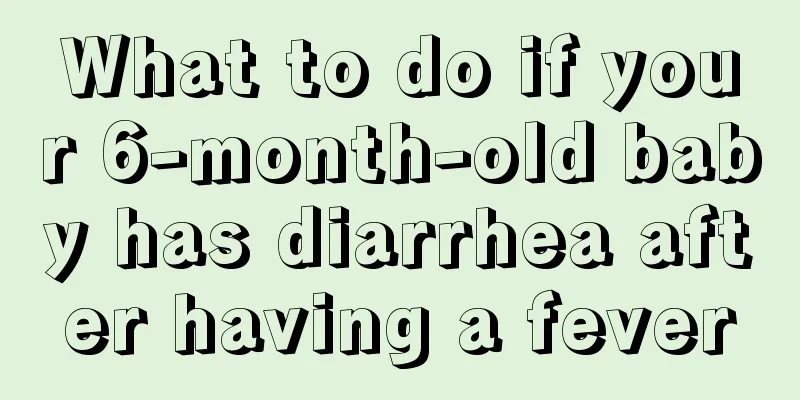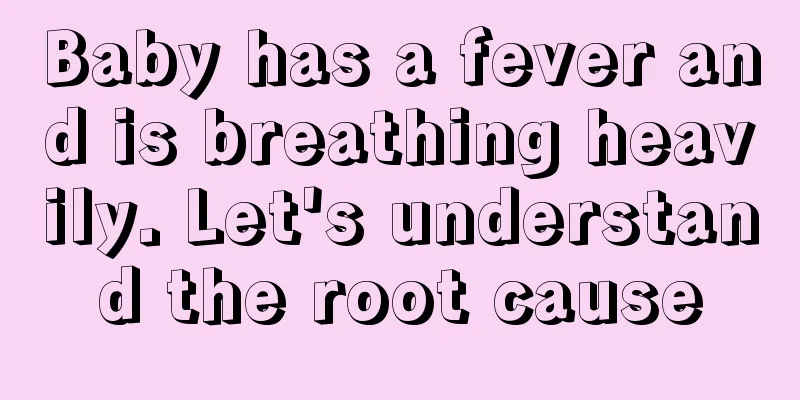Is it normal for a newborn to have smelly farts?

|
It is a very normal physiological phenomenon for newborns to fart. Generally, they will fart as long as they are fed or eating complementary foods. However, if the baby has a problem with smelly farts, it may be caused by indigestion. In addition, it may also be because the baby needs to defecate. In addition, if the baby farts frequently, farts with poop, or farts that are empty, it all indicates that the baby has some health problems. 1. Fart odor This may very well be a precursor to defecation. There is a saying that goes: wind is at the head of rain, and fart is at the head of shit. When the baby has difficulty defecating, intestinal motility increases, which will expel the gas in the intestine, usually in the form of smelly farts. After the feces are expelled, the baby will no longer fart smelly. If your baby farts frequently, smells sour, and burps constantly for a period of time, it may be that he has recently consumed too much fat and protein, causing indigestion. At this time, parents should reduce the amount of milk, add boiled water to reduce the intake of fat and high-protein food, make the food thinner, and appropriately add milk containing bifidobacteria and glucose. Bifidobacteria can be converted into bifidobacteria in the gastrointestinal tract, which have the effect of inhibiting Escherichia coli and promoting food digestion and absorption. 2. Fart a lot The baby may swallow too much air during the process of sucking milk, which is an important reason for the baby to fart a lot. At the same time, because the gastrointestinal tract of infants is immature, the intestinal motility of infants at different stages is not coordinated, causing intestinal bloating, which will cause gurgling sounds in the stomach. The more gas you expel, the more farts you will naturally produce. If your baby cries frequently for no apparent reason and farts a lot, this phenomenon is medically called infant colic. Infantile colic is the most common type of acute abdominal pain in children. It often occurs at night, mostly in infants under 3 months old, and is more common in infants who are easily excited, excited and irritable. Parents need to observe their babies closely. If they have fever, pale face, repeated vomiting, bloody stools, etc., they should go to the hospital for examination immediately. 3. Farting with poop This situation is more common in breastfed babies and less common in formula-fed babies. This is mainly diarrhea caused by breastfeeding (i.e. breast milk diarrhea), because the prostaglandin content in breast milk is high, which promotes the movement of small intestinal smooth muscles, increases the secretion of water and electrolytes, and produces loose stools. Therefore, breastfed babies have more and thinner stools, and their farts will bring out stools. Mothers do not need to be surprised by this. For older babies, farting with feces is mostly caused by eating too much food with high starch content. At this time, you should reduce the consumption of foods with high starch content and appropriately increase the intake of protein and fat foods. In addition, other gastrointestinal disease factors cannot be ruled out, such as: the baby eats too much and incomplete digestion of food; intestinal virus and bacterial infection; intestinal flora imbalance, etc., which will increase the baby's bowel movements, mixed with smelly farts, and the stools will be thin or contain mucus and blood. 4. Empty Fart The baby farts intermittently, but without any odor, accompanied by bursts of bowel sounds. This is mostly caused by increased intestinal motility due to hunger after the gastrointestinal tract is empty. At this time, you should feed it in time. So, farting may also be related to being hungry. In addition, if the baby is breastfed and the feeding posture is incorrect, the baby may inhale a lot of air; if the baby is bottle-fed, if the bottle is not completely inverted and the milk does not fill the nipple, the baby will inhale air while sucking milk; also, if the baby cries while eating, air will enter the stomach along with the milk. In addition, protein and lactose enter the intestines through the stomach, and the bacteria in the intestines will break down the incompletely digested protein and lactose to produce excessive gas. The above common situations will cause the baby to fart. |
<<: Why do children toss and turn in their sleep?
>>: Newborn baby sleeps too long
Recommend
Chinese medicine massage for children with cough
Nowadays, traditional Chinese medicine treatment ...
How long does it take for physiological jaundice in newborns to subside?
Babies are prone to symptoms of jaundice right af...
What to do if a 6-year-old child has a fever and convulsions
The weather changes drastically with the change o...
What are the benefits of a lunch break for children?
Children’s learning tasks are still quite heavy a...
What's wrong with children who always hit their heads? Parents should pay attention to it
Many parents always find that their children alwa...
Early symptoms of autism in newborns
Many friends simply think that autism is a psycho...
What is the cause of the child's chicken swelling?
Swelling of children's genitals is mostly cau...
What kind of rice noodles are good for children?
When the baby grows to 6 months, the gastrointest...
How to relieve stomach pain in children
In daily life, children may also experience vario...
Why do children love to blink?
Today's children are lively, cute, active, an...
Why does my baby have pain around his belly button?
Pain around the baby's belly button is a comm...
Newborn Baby Eats Mommy Love
We all know that children's affairs are what ...
One year old child has blue spots on forehead
Newborn babies will have blue marks on their bodi...
What’s going on when my baby has small red bumps on the palms of his hands?
Many mothers may find that their babies have smal...
Symptoms of iron deficiency in four-month-old babies
I believe many people know that babies are very w...









